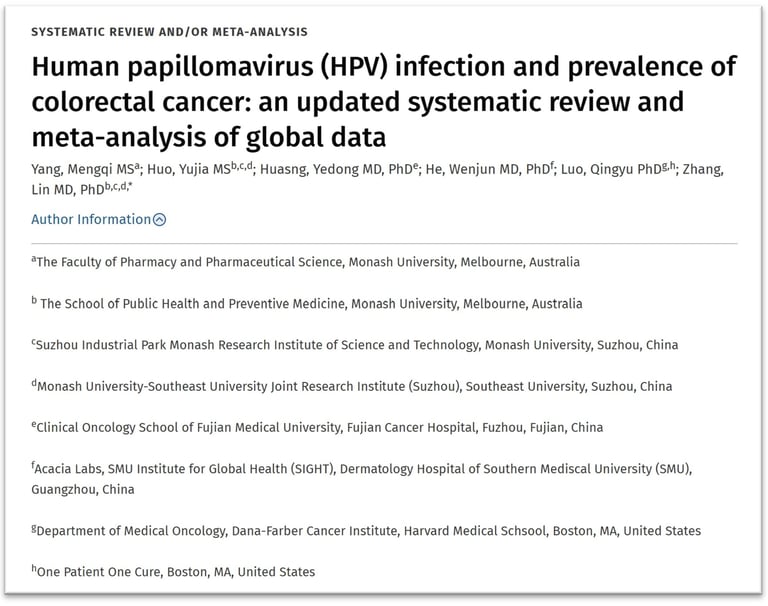

We are pleased to share the publication of a collaborative project between One Patient One Cure and Monash University in the International Journal of Surgery:
Human papillomavirus (HPV) infection and prevalence of colorectal cancer: an updated systematic review and meta-analysis of global data
DOI: 10.1097/JS9.0000000000003426
This work represents a significant step toward understanding the potential oncogenic role of human papillomavirus (HPV) in colorectal carcinogenesis and has important implications for prevention and screening strategies worldwide.
Study Overview
The investigators conducted a systematic review and meta-analysis following PRISMA guidelines, synthesizing data from all relevant observational studies published through May 2025. The analysis compared the prevalence of HPV in colorectal cancer (CRC) tissues versus non-cancer controls, taking into account geographic region, detection methods, tissue preparation, and HPV genotype.
Key Findings
Strength of Association: The pooled analysis revealed that individuals with HPV infection had approximately 2.4-fold higher odds of having colorectal cancer compared to HPV-negative individuals, confirming a statistically significant association.
Regional Variation: The association was strongest in studies conducted in Asia (odds ratio ~3.7), suggesting potential geographic or population-specific differences in HPV-related oncogenesis.
Tissue Type and Methodological Factors: Studies utilizing formalin-fixed paraffin-embedded (FFPE) tissue samples showed stronger associations, underscoring the importance of sample type and detection methodology in accurately identifying HPV DNA.
HPV Genotype: Subgroup analyses demonstrated that HPV-16 was more strongly associated with CRC compared to studies that did not specify genotype or included mixed HPV types.
Clinical and Scientific Implications
These findings contribute to the growing body of evidence suggesting that HPV may play a role beyond cervical, anal, and oropharyngeal carcinogenesis, potentially contributing to colorectal cancer development. This has several important implications:
Risk Stratification: Incorporating HPV status into colorectal cancer risk models could allow for more refined identification of high-risk populations.
Prevention Strategies: If a causal relationship is confirmed, HPV vaccination programs may offer an additional avenue for CRC prevention, particularly in regions with high HPV prevalence.
Future Research Directions: Mechanistic studies are warranted to determine whether HPV infection contributes directly to malignant transformation of colorectal epithelial cells, as well as longitudinal studies to establish temporal relationships between infection and disease onset.
Significance of the Collaboration
This study highlights the power of cross-institutional collaboration in addressing globally relevant questions in cancer epidemiology. The partnership between One Patient One Cure and Monash University integrated expertise in systematic evidence synthesis, biostatistics, and translational oncology to produce findings that may ultimately inform public health policy and clinical practice guidelines.
Conclusion
The results of this meta-analysis provide robust evidence of an association between HPV infection and colorectal cancer prevalence, supporting further investigation into the role of viral oncogenesis in CRC. As a patient-centered research initiative, One Patient One Cure remains committed to supporting research that advances understanding of cancer etiology and informs strategies for prevention, early detection, and precision medicine.

